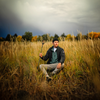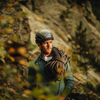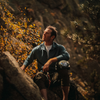The Rise. The Shine. featuring Jack Ryan
The Rise. The Shine.
The Rise. The Shine. featuring Jack Ryan
2024 / 5 mins
by Tommy Corey
"Community is really important to me, and it brings me a lot of joy and freedom because, you know, we're all there for the same thing, disabled or not. I'm incredibly grateful for that."


The clock was approaching 1 pm on a Saturday in late November when Jack Ryan was at his weekly Jiu-Jitsu practice. Brazilian Jiu-Jitsu is a martial art and combat sport focusing on ground fighting and submission holds, highlighting technique and leverage to overcome opponents. Jack, 29, from San Diego, California, an athlete in surfing and various outdoor sports, had been practicing the art of Jiu-Jitsu for a year and a half. This practice, in particular, initiated events that would redefine his relationship with the outdoors, his body, and the rest of his life.
Without the opportunity to tap out, an act meant to submit to your opponent, Jack's neck was forcibly broken by his Jiu-Jitsu instructor, rendering him a walking quadriplegic with incomplete paralysis at the C4 and C5 vertebrae. The aftermath was led by a hemorrhagic stroke that struck about 12 hours later due to internal bleeding. Jack spent two and a half weeks in a coma. Upon regaining consciousness, his sole means of communication involved blinking through an alphabet board, a method he used for the following week or so as he regained the strength to speak again.


Eventually, Jack was transferred to Craig Hospital in Denver, where he spent another four months working toward recovery. Hospitalization became a haven providing necessary care but a battlefield where he grappled with the emotional and physical impacts of being a newly disabled individual.
Released from recovery, Jack faced the new reality of life without a driver's license, imposing limitations on his outdoor activities. However, a turning point came through a seemingly ordinary social media post, where Jack sought direction to return to the outdoor spaces that once defined his life.
"I remember making an Instagram post back in July of 2019 [being like], 'I'm an athlete. I surfed. I ran up mountains for fun before I got hurt, but, I'm at a loss for words and loss of direction for what I can do with this newly disabled body.' And I think that was the tipping point of a lot of people reaching out to me about various adaptive sports - and the first one that came up was rock climbing."
The response was transformative, introducing him to adaptive sports, offering a glimmer of hope and a route back to the activities he thought were forever altered.


For Jack, most outdoor sports seem to unfold in slow motion due to the constant struggle within his body. The tone and spasticity resulting from the misfiring of muscle groups make any rapid movement a challenge. Running and swimming are an impossibility. However, Jack finds solace and logic in activities like rock climbing, appreciating their slow and methodical nature. The deliberate pace provides a sense of control. Similarly, cycling aligns with his capabilities, as it operates on a pedal cadence, allowing for increased balance. In this way, the world of cycling not only becomes accessible but also empowers Jack to keep pace with able-bodied individuals.
Jack's disability extends beyond just the physical realm; it encircles the emotional toll of managing the vacuous judgments of strangers. The grey area of his disability, a paradoxical blend of visible and invisible, presents a unique challenge. Jack grapples with the need to articulate his disability, confronting understanding and ignorance equally.
"I am not only navigating the world at large, but I'm navigating so many micro barriers throughout the day: Cracks on sidewalks, curbs, stairs, and navigating around corners. Every single little thing in a closed or open environment is an obstacle in some form for me. My situation is an anomaly that doesn't make sense to the broader public."
Now, five years post-incident, Jack reflects on his disability, expressing that he would never wish such a fate even upon his worst enemy. Despite the challenges he faces, the intentional approach he takes to his time spent outdoors with others brings him solace.


"Community is really important to me, and it brings me a lot of joy and freedom because, you know, we're all there for the same thing, disabled or not. I'm incredibly grateful for that." Jack recognizes the profound development of empathy through his outdoor engagements, leading to a heightened understanding of others' struggles and challenges. Whether witnessing someone's climbing difficulties or navigating day-to-day interactions, this cultivated empathy becomes the cornerstone of community.
He emphasizes that true community is impossible without empathy, as it involves shared pursuits, understanding, and collective support for each individual's unique journey. The shared outdoors, marked by intentionality and compassion, becomes a conduit for creating a broader, more diverse experience within the community—a realization that Jack finds genuinely enriching.
"I think, finally, just like it [disability] creates, as stressful as it can be, it creates a more present experience for both myself and all those involved because we all recognize that we truly are there for the same thing, even if we may go about it differently. But at the end of the day, we're sharing this outdoors experience, and that's truly what matters."
Jack’s story truly exemplifies the Vuori moto of The Rise. The Shine. We are so inspired by his story, the challenges he has faced and overcome, and the way he continues to follow his passions and connect with his community of adaptative athletes. Stay tuned for more inspiring stories written by Tommy Corey in the coming months.
In his unwavering commitment to fostering inclusivity in the outdoors, Caziah's evolving perspective embraces the idea of partnership and community, seeking a paradigm shift where everyone is valued as an integral part of the outdoor narrative. In his quest for a more equitable and inclusive outdoor space, Caziah encourages a holistic approach, recognizing that actual change begins with genuine connection and understanding.

